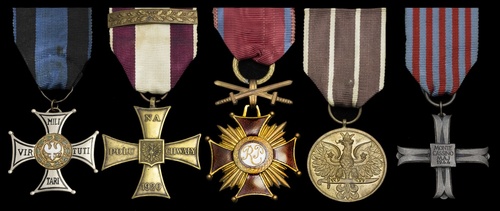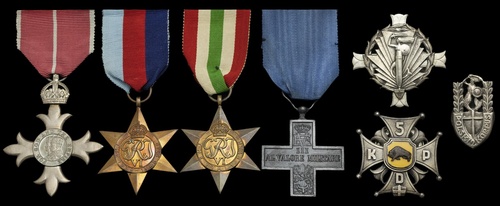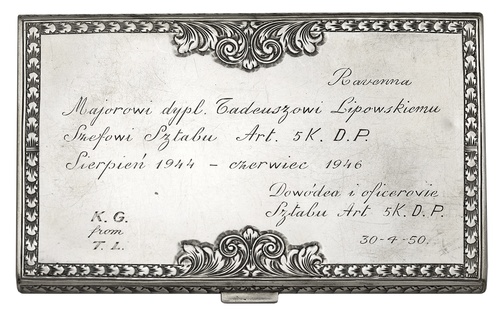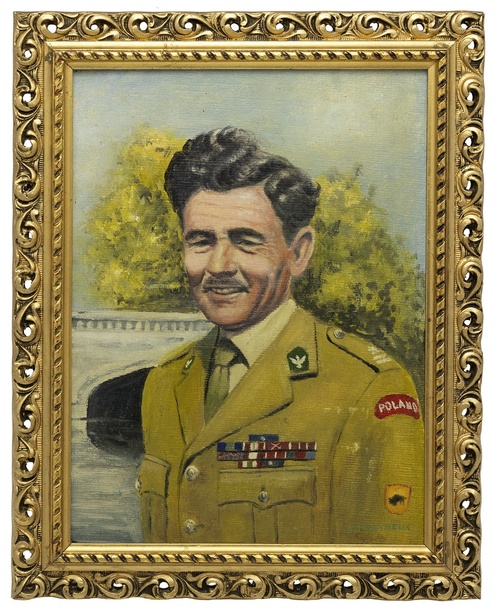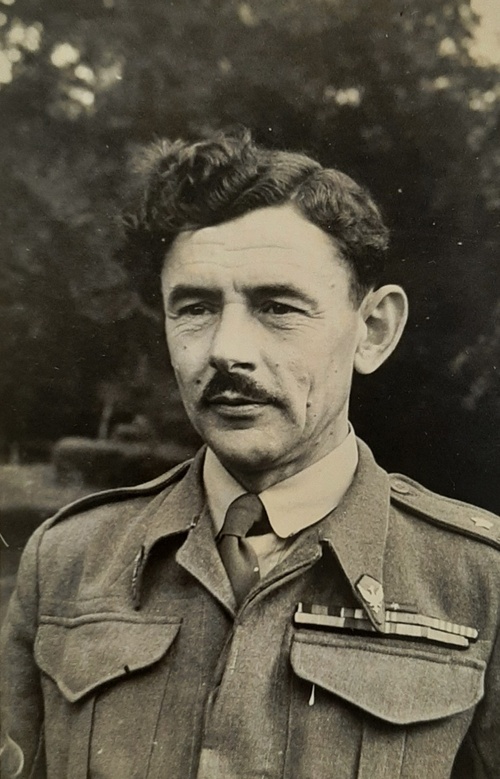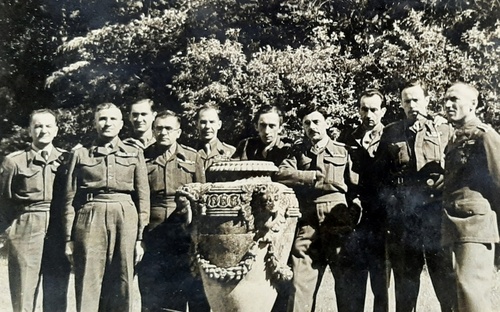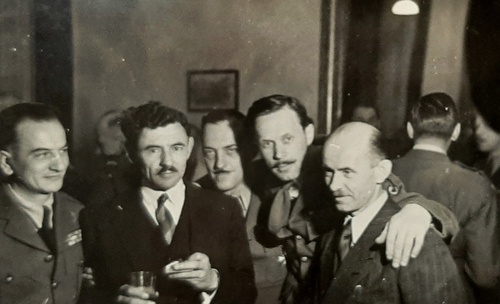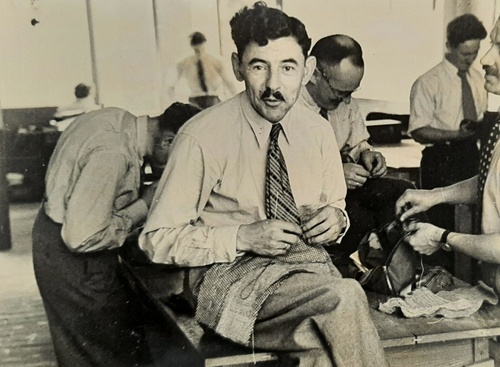Auction: 25001 - Orders, Decorations and Medals
Lot: 325
(x) The rare and superb 'Operation Grapeshot' M.B.E., 'Monte Rogno' Virtuti Militi, 'Monte Cassino' Cross of Valor group of nine awarded to Lieutenant-Colonel T. Lipowski, 9th Heavy Artillery Regiment, Polish Army, whose remarkable life story includes a tragic episode during the Fall of Poland which saw him narrowly escape the fate of two of his comrades, who were arrested and murdered during the Katyn Massacre
Returning to active service his extreme bravery attached to the 5th (Kresowa) Division in Italy saw him honoured on several occasions and even wounded during the Battle of Monte Cassino, being hit by shrapnel that had already passed through the lung of a brother Officer who stood beside
Poland, Republic, Order of Virtuti Militari, breast Badge, 5th Class, silver and enamel, of wartime manufacture by Spink; Cross of Valor, with Second Award Bar; Cross of Merit, with swords, 2nd Type, silver-gilt; Army Medal; Monte Cassino Cross 1944, the reverse officially numbered '33078'; United Kingdom, The Most Excellent Order of the British Empire, 2nd Type, Military Division, Member's (M.B.E.) breast Badge, silver; 1939-45 Star; Italy Star; Italy, Kingdom, Croce al Valore Militare, sold together with an archive including a named cigarette case, portrait and photograph album and the named document of issue for the award of the M.B.E., overall good very fine (9)
Virtuti Militari awarded 30 June 1944, the original citation (translated) states:
'During the operations 'Adriatyk', he distinguished himself by working in difficult conditions under strong and accurate enemy fire, especially at the Observation Point on Monte Regano. He cooperated perfectly with the infantry, conducting accurate and effective fire, not breaking off observation despite the fire. With his behaviour, he set an exemplary example for officers and privates at the Observation Points, as always. He fully deserves the decoration.'
Cross of Valor awarded 6 August 1944, the original citation (translated) states:
'At Cassino he organized an Observation Point and stayed there. On May 10-12, 1944, despite heavy enemy mortar and artillery fire, he remained at the Observation Point and continued his work. On May 12, 1944, despite heavy fire, he left the Observation Point to get better information and moved forward. He was wounded, but he did not want to stop his work.'
Second Award Bar awarded 1945.
M.B.E. London Gazette June 1945, the original recommendation states:
'During the period 9th -21st April 1945, this officer worked with the maximum devotion as B.M., F.A. 5th Kresowa Division Artillery, which was in support of the Infantry in their operations against lines of Rivers Senio, Santerno, Sillaro, Gaina and Idice. Major Lipowski made a particularly great effort and showed special dexterity on 19th April and night 19th/20th, when Headquarters 5th Kresowa Division was faced with the task of co-ordinating the fire plans not only of the Divisions Artillery but also Artillery under command of the neighbouring RAK Force (Reinforced 2 Polish Armoured Brigade with 2 British Royal Horse Artillery and 3 Polish Field Regiment in SP). Rud Force (3rd and 4th Polish Infantry Brigades supported by 5th Polish Field Regiment and 7PHA) and AGPA.
Major Lipowski's skillful [SIC] Staff work at HQ 5th Kresowa Division Artillery on 19th April and night 19th/20th resulted in the rapid working out and co-ordination of the Artillery fire plans which effectively helped the Infantry and assisted the Armour in breaking down enemy opposition, crossing the Gaina River and approaching River Quaderno.
The Staff work at HQ 5th Kresowa Division Artillery had to be completed in a limited time in order to prepare the above Artillery plans and called for great effort and extreme accuracy. Major Lipowski not only directed the Staff work most efficiently but shone as an example of adroitness and devotion to duty.'
Note the number of the recipient's Monte Cassino Cross is confirmed upon the roll.
Tadeusz Lipowski was born on 29 March 1904, the son of two flour mill owners. His parents were forced to produce food for the German Army during the Great War, whilst the young Lipowski attended the local grammar school. Joining the Infantry Cadet School in 1926 he transferred to the Artillery Cadet School the next year and was commissioned Lieutenant in 1929.
September 1939 and escaping to fight again
Posted to Bendzen, Lipowski was set to work training new recruits, he was still there when the German Army invaded Poland in September 1939. His Regiment was left in an exposed position and forced to withdraw to avoid being encircled.
Lipowski was interviewed post-war and the interviewer wrote a summary of his experiences, this narrative takes up the story:
'The regiment was soon split up and within three days it had been officially annihilated although splinter groups had joined other regiments to continue fighting. Tade was able to join the Le Wolf East Polish soldiers on the 21st September and together they had fought their way out of danger or so they thought. Similar situations repeated themselves throughout Poland where the soldiers fought bravely on their own without the support of their planes which had been destroyed during the first day and without the aid of advanced weaponry…'
Not long later the Russians invaded as well, tightening the noose around the Polish Army, communications at the time meant that many soldiers were not even aware of the Russian attack. One of these was Lipowski who awoke in a wood one morning to the sight of a Russian soldier on patrol. Unsure of whether this man was a friend or foe he remained hidden as the unsuspecting Russian passed beneath his sights, it was not until later that he discovered how close he had come to disaster.
As the Polish defences were overrun, the Regiments began to splinter in small groups either seeking to withdraw to France and carry on the fight or set up resistance organisations. Lipowski, accompanied by two brother Officers, returned to the town in which he had been at school. His sister was living in the town and while they planned their next step she concealed them in her home.
His brother came up with a plan to move them to a safer location by dressing the three men in his suits and putting them in the back of a wagon driven by a friendly farmer. Lipowski was forced to borrow a suit by his brother however the two Officers with him refused as the suits were expensive and they didn't want to take them. Instead, they removed their rank pips and took on the appearance of other ranks.
During the journey the travellers were stopped by a Russian soldier, the farmer attempted to explain away the soldiers in his cart however this was for naught:
'The Colonel could remain silent no longer and admitted to the Russian that they were in fact Officers so that the farmer would not get into trouble. Tadek said nothing but looked straight ahead. These Officers were only two of the many who were shot at Katyn by the Soviet secret police and left to rot in the mass grave, later discovered and dug up by the Germans two years later. Tadek had once again narrowly escaped death by what he called "good luck".' (Ibid)
Reaching an underground resistance organisation, Lipowski was concealed by them and on 25 December 1939 dressed as a civilian he set out for southern Poland and the border. At one point he was stopped by a German soldier and asked when he was going, for one heart stopping moment it seemed that he was caught. This was not the case however, and it turned out the German was drunk and looking for someone to share a beer with - Lipowski agreed to a drink and later the soldier even waved him off on the train.
Meeting with several other soldiers he joined them in the punishing border crossing, through terrible weather the group managed to enter Hungary. Lipowski was fortunate, he had a premonition that he might need ski boots and so had brought a pair. Several of his companions had not been so fortunate and had their feet amputated due to frostbite, that is not to say Lipowski got off totally free of injury, losing several fingers to the same affliction.
France and Britain
Travelling from Hungary to France he undertook a training course there at the Coëtquidan Military Academy but was soon forced to leave the country. Although Polish troops did take part in the France 1940 campaign Lipowski was not amongst them, instead being evacuated from La Rochelle aboard a British coal barge.
They arrived in Glasgow and there he was posted to the 4th Heavy Artillery Regiment, undertaking further courses in Scotland in 1940 and 1941. After the German invasion of Russia large numbers of Polish prisoners of war were released by the Russians and formed into an army under General Wladyslaw Anders, soon christened II Polish Corps.
Lipowski was not sent to join this unit in the desert but instead remained in Russia to perform a training role. Ensuring that the men sent from Russia were fully trained on the equipment they were receiving before they joined the 5th Kresowa Division.
Italy and Cassino
The Division entered the line in Italy in 1944 and was posted to the fierce Battle at Monte Cassino. At this time, Lipowski was stationed with 9th Heavy Artillery Regiment commanding a battery of 8 guns. Installing himself in an observation point just 100 yards from the German lines he called firing instructions to the guns.
'One morning, a German canister exploded right next to the observation post in which Tadek was stationed. A rather large piece of shrapnel sliced through the Lieutenant['s] lung and another embedded itself in Tadek's arm near the shoulder and protruded near his elbow.' (Ibid)
Lipowski's wound was worse than it appeared, however, he still saw to the severely wounded Lieutenant and helped him to a nearby aid post. With this done he attempted to return to the line only to be stopped by a doctor:
'As Tadek turned to leave, the doctor noticed blood dripping from his jacket near his elbow and told Tadek that he had lost far too much blood. Tadek, being a proud man, refused the stretcher to the next field hospital after having a drink of whisky and he waited outside the tent until the more severe casualties had been seen to. When the medic found out he scolded Tadek and have him another drink of whisky to compensate for the inconvenience of the delay. He then attended successive field hospitals each accompanied by a drink of whiskey. On arriving at the permanent hospital after only an hour's journey, Tadek was eventually so drunk that the doctors claimed that he did not need the aesthetic to numb the pain of the operation to remove the shrapnel.' (Ibid)
Not long after his return to the Regiment he was advanced Lieutenant-Colonel and played a crucial role in planning the Polish contribution to the Battle of the River Po. As a combined fire plan was needed Lipowski was sent to headquarters as a Liaison because he spoke English well. There he spoke for the five Regiments in his Brigade in producing a fire plan which encompassed fully twenty Regiments.
It was due to his very capable staff work and his diplomatic handling of a multinational team in this situation that he was awarded the M.B.E.. His final award was for Operation Adriatic - launched around the rural community of Rogano near Milan. Here his calm and professional attitude under fire earned him the Virtuti Militari, the highest military honour available to the Polish Government.
Epilogue
He remained in Italy after the war ended to guard the artillery pieces being laboriously packaged and shipped back to Britain and briefly served as a Chief of Staff before returning himself. After a six month tour of Staff College he was officially demobilised and returned to live in Britian.
The end of his story is tinged with tragedy as his faithful Batman John attempted to return to Russian-occupied Poland. Fearing for his safety, Lipowski gave him a postcard marked with his address in Britian so that the illiterate John could signal when he safely returned home. The card never arrived with him and Lipowski did not know what had happened to his comrade.
Sold together with copied research comprising service papers and recommendations in Polish, a typed summary of the post-war interview with the recipient and the roll for the Monte Cassino Cross as well as an archive of original material including a portrait of the recipient, an annotated photograph album and a silver cigarette case engraved with the recipient's name and unit details in Polish.
Subject to 5% tax on Hammer Price in addition to 20% VAT on Buyer’s Premium.
Estimate
£2,500 to £3,000
Starting price
£2300

